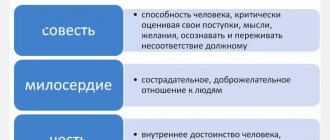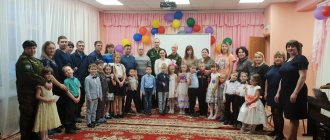Modern forms of work on spiritual and moral education
Modern forms of work
spiritual and moral education
Society is only able to set and solve large-scale national problems when it has a common system of moral guidelines. And there are these guidelines where they preserve respect for the native language, for the original culture and original cultural values, for the memory of their ancestors, for every page of our national history.
Education plays a key role in the spiritual and moral unity of society. School is the only social institution through which all Russian citizens pass. Personal values, of course, are primarily formed in the family. But the most systematic, consistent and profound spiritual and moral development and upbringing of the individual occurs in the sphere of education. Therefore, it is at school that not only the intellectual, but also the spiritual and cultural life of the student should be concentrated.
A school-age child, especially in elementary school, is most susceptible to spiritual and moral development and education. But the shortcomings of this development and upbringing are difficult to make up for in subsequent years. What is experienced and learned in childhood is characterized by great psychological stability.
The methodological basis for the development and implementation of the federal state educational standard of general education is the Concept of spiritual and moral development and education.
The concept defines the goals and objectives of spiritual and moral development and education of the individual, a system of basic national values, principles of spiritual and moral development and education of the individual.
Education should be focused on achieving a certain ideal. What ideal does the Concept of spiritual and moral development and education of the individual orient us toward?
The modern national educational ideal is a highly moral, creative, competent citizen of Russia, who accepts the fate of the Fatherland as his own, aware of responsibility for the present and future of his country, rooted in the spiritual and cultural traditions of the multinational people of the Russian Federation.
The main content of spiritual and moral development, education and socialization are basic national values. We preserve these values in cultural and family traditions and pass them on from generation to generation. Relying on these values helps a person resist destructive influences.
What are our traditional sources of morality? This is Russia, our multinational people and civil society, family, work, art, science, religion, nature¸ humanity. Accordingly, the basic national values are determined:
– Patriotism – love for one’s small Motherland, one’s people, for Russia, service to the Fatherland;
– family – love and loyalty, health, prosperity, respect for parents, care for elders and younger ones, care for procreation;
– work and creativity – respect for work, creativity and creation, determination and perseverance;
– art and literature – beauty, harmony, the spiritual world of man, moral choice, the meaning of life, aesthetic development, ethical development;
– nature – evolution, native land, protected nature, planet Earth, environmental consciousness;
Basic values should underlie the way of school life and determine the classroom, extracurricular and extracurricular activities of children.
In other words, the integrativeness of all programs for the spiritual and moral development of the individual is necessary.
Work in our school is carried out in the following areas:
| Main directions |
| Module “I am a citizen”. Education of citizenship, patriotism, respect for human rights, freedoms and responsibilities. |
| Module “I am a man” Education of moral feelings and ethical consciousness. |
| Module “I and work” Fostering diligence, a creative attitude to learning, work, and life. |
| Module “Me and Health” Formation of a value attitude towards health and a healthy lifestyle. |
| Module “Me and Nature” Fostering a value attitude towards nature and the environment (environmental education). |
| Module “Me and Culture” Cultivating a value-based attitude towards beauty, forming ideas about aesthetic ideals and values (aesthetic education). |
Implementation methods:
1. Visual (illustrative story with a discussion of the most complex issues of the topic; conducting didactic games; excursions; working with texts.. 2. Verbal (reading literary works, followed by discussion and a creative task; conversation with consolidation of the material in creative works under the guidance of a teacher; conducting role-playing, didactic games, analysis of everyday situations, conducting quizzes, competitions, theme evenings) 3. Practical (organizing the productive activities of students).
Forms of working with children:
– Individual and group classes, conversations, games with moral and spiritual content. – Creative artistic activities of children: needlework, drawing, creating arts and crafts items
– Organizing holidays and events. – Use of multimedia technologies (correspondence excursions, virtual museum, creation of presentations). – Research activities of students. – Excursions (to nature, the Mint, the Museum of Icons and others) – Organization of exhibitions. – Thematic and creative evenings. – Participation in competitions, festivals, concerts.
The class teacher carries out this work in the system of extracurricular activities, that is, he acts as the main organizer of the spiritual and moral education of students during extracurricular hours. He faces the most important task of instilling moral skills and habits in his pets, and developing unity of speech and behavior in them. In this regard, the involvement of every student in practical, labor and cultural activities is of great importance. A very important task of the class teacher is to subordinate all aspects of extracurricular educational work to the moral development of schoolchildren.
Extracurricular activities of schoolchildren is a concept that unites all types of activities of schoolchildren (except academic ones), in which it is possible and appropriate to solve the problems of their upbringing and socialization - this is an integral part of the educational process at school. It contributes to the implementation of the requirements of federal educational standards for general education. Its advantages: providing children with a wide range of activities aimed at developing the student.
The school provides general education, which is very important and significant, but it is additional education in extracurricular activities that contributes to the development of the individual, the discovery of his abilities, early career guidance and spiritual and moral education.
Simple arithmetic calculations show that a student is free from school for at least 150 days a year. But a child is never free from himself. And we, adults, do not have the right to deprive a child of the opportunity to choose an environment where he can express himself and master the ways of intelligent life. It is enough for the teacher to think through a system for choosing a task to his liking, to identify the child’s preferences, and he can develop his abilities in a variety of directions, and do this right at school, without dooming the child and his parents to look for additional services on the side.
The extracurricular activity program “I am a pedestrian and a passenger” is aimed at developing in the child independence and personal responsibility for his actions, compliance with traffic rules; awareness of human responsibility for general well-being;
These activities require a creative approach and can be of different types:
– conversations including questions of hygiene, nutrition and hardening provide knowledge in the field of health improvement; dynamic pauses, business games, competition games contribute to the development of children’s positive attitude towards the basic values of modern society.
Artistic and aesthetic education is implemented through the “Funny Colors” classes. These activities help children see and comprehend the world of things and objects in everyday life in a new way, awaken their imagination, and encourage active creative search and creation. In extracurricular activities “School of Communication” and “Umka”, children get to know each other, learn to identify their character traits, and become familiar with psychological concepts at an accessible level.
Humanistic pedagogy is distinguished by its focus on accepting the child as a person and individuality, on protecting his right to self-development and self-determination.
The Federal State Educational Standard for General Education pays special attention to the student’s extracurricular activities and defines space and time in the educational process.
Spiritual and moral education is one of the main components of the educational process at school, which helps to raise honest, kind, hardworking people, will help them find their place in life, and use the acquired knowledge and skills for the benefit of the Motherland.
Moral education of older preschoolers through various types of activities.
Goal: expand children's knowledge about New Year's charactersGoal: to tell children about what Santa Claus is called in other countries.
Goal: to develop children's creative abilities
Goal: to develop children's creative abilities
Goal: to expand children’s knowledge about the custom of decorating the Christmas tree with toys; introduce the symbols of different years.
Goal: to expand children’s knowledge about New Year’s symbols and New Year’s customs.
Goal: to cultivate in children and parents a desire to invent and create something together.
Goal: To create a desire for everyone to decorate the group together and work together.
Goal: to instill a desire to take care of family and friends.
Goal: to make children want to celebrate together, to create a joyful mood.
Goal: acquisition of cultural knowledge necessary for the comprehensive development of children, education and development of spiritual and moral values of the individual.
Goal: to cultivate in children and parents a desire to invent and create something together.
Goal: to expand and deepen the opportunities for the emergence and consolidation of sustainable cognitive interests.
Goal: formation of logical thinking and perception skills.
Goal: to develop creative abilities in children.
Goal: patriotic education of children, knowledge of the history of their native land.
Goal: to develop children's creative abilities.
Goal: expand children's knowledge.
Goal: to expand children’s knowledge about Russian holidays.
Goal: to develop children's creative abilities.
Goal: to cultivate in children and parents a desire to invent and create something together.
Goal: to consolidate children’s ability to sculpt the figure of a person and an animal, conveying the image of a border guard and his faithful dog friend.
Goal: to develop the creative abilities of children, to encourage them to take an active part in the social life of the group.
Goal: to develop children’s creative abilities, to consolidate children’s ability to convey characteristic human features in a drawing.
Goal: to instill a desire to take care of family and friends.
Goal: expand children's knowledge.
Goal: to expand children’s knowledge about Russian holidays.
Goal: to develop children’s creative abilities, to consolidate children’s ability to convey characteristic human features in a drawing.
Goal: to form the desire of children to make crafts from plasticine using the bas-relief method.
Goal: to instill a desire to take care of family and friends.
Goal: to develop the creative abilities of children, to encourage them to take an active part in the social life of the group.
Goal: develop perception skills.
Goal: to improve children's health.
Use technologies for teaching a healthy lifestyle.
Foster a competitive spirit. Spending leisure time together with parents.
Goal: expand children's horizons and develop their imagination; cultivate a sense of patriotism and pride for the Fatherland.
Goal: to continue to form children’s ideas about space; develop children's creative abilities.
Goal: to expand and deepen the opportunities for the emergence and consolidation of sustainable cognitive interests.
Goal: fostering conscious love for the Motherland, respect for the historical past of one’s people using the example of feats accomplished during the Great Patriotic War.
Goal: expand children's horizons and develop their imagination; cultivate a sense of patriotism and pride for the Fatherland.
Goal: to develop the ability to listen to new works, follow the development of action, and empathize with the characters.
Goal: to develop children's creative abilities.
Goal: to develop the creative abilities of children, to encourage them to take an active part in the social life of the group.
Goal: broaden the horizons of children; cultivate a sense of patriotism and pride for the Fatherland.


